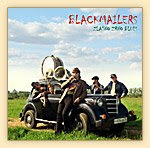here is the list of winners for 2009:
Band, 1st place
South Florida Blues Society--JP Soars & the Red Hots
Band, 2nd Place
Cascade Blues Association--Ty Curtis Band
Band, 3rd Place
Ottawa Blues Society--MonkeyJunk
Best Guitarist (in a a band) Award
JP Soars
Solo/Duo, 1st place
Blues Society of Tulsa--Little Joe McLerran
Solo/Duo, 2nd Place
Crossroads Blues Society of Mississippi--Alphonso & Richard
Best Self-Produced CD Award
"Hollerin'!" Nathan James & Ben Hernandez took home the Best Self-Produced CD Award for their newest effort (Many of you will recall, this duo won the 2007 International Blues Challenge).
Here is a summary of the IBC week (from http://blues.org/ibc/past.php?YearId=25)
It was not that long ago that the IBC, aka the International Blues Challenge, hosted 20 to 30 acts which competed in one or two clubs on Beale. Solo performers and bands were lumped in the same category and the few fans, mainly family, crammed into the New Daisy theater. Today it has grown into a world class event with enough music to satisfy every blues taste.
For those not familiar with the format, 10 clubs on Beale Street each host 10 bands for a 25 minute performance on both Thursday and Friday nights. Another 6 clubs host 10 solo/duo acts during the same period. The top scoring band in each venue then moves to the Saturday finals.
With program in hand, one simply darts from club to club starting at 5 PM searching out the best of Beale. When the dust finally settles, around midnight, your friends will tell you about all the great bands you missed. That sets up your Friday schedule.
This year, the Blues Foundation started Friday’s music at 11 AM with two exciting showcases during the afternoon. Alfred’s hosted a showcase of 11 International acts which came to Memphis to compete. High energy bands from France’s Blues Sur Seine, Norway, Croatia, Ottawa, Quebec, Australia, Israel, and Italy showed all afternoon that the blues thrives around the world. At the same time, the Foundation hosted a Youth showcase for 24 bands whose members were under 21 years old. Blues Societies were asked to send their best Youth band to showcase talent. Held in four clubs on Beale, the Youth Showcase featured a 9 year old string slinger, a 15 year old slide guitarist, bass players whose bass is bigger then they are, and a 14 year old boogie woogie master. This showcase was enough proof that the blues can still catch the ears of today’s younger generation.
As it that was not enough music, Blind Raccoon and Yellow Dog Records each held showcases in the Rum Boogie and King’s Palace respectively. At the Blind Raccoon show, fans could hear musicians like Dave fields, Chris James, Patrick Rynn, Tas Cru, Billy Gibson, Steve Howell, and the Delta Flyers. The highlight here was when Super Chikan unveiled his OBAMA guitar, complete with Chikan’s unique stimulus package. Yellow Dog’s show included the varied musical Mary Flower, Rich Del Grosso and Fiona Boyes.
Highlights of my two days of running from club to club included the Grady Champion revue from Jackson, MS. I first met Grady 13 years ago and haven’t seen his show in almost 10 years. His combination of Southern soul, funk, and blues was a refreshing break from blasting guitars. Another highlight was the sweet, acoustic stylings of Washington’s Alice Stuart. There were explosive sets by Austin’s Mike Milligan and the Alter Boyz, Conrad Oberg on both piano and guitar, Dan Treanor’s trippy Afrosippi blues band, and the Phil Gates band. On the street I had difficult choices between the booming voice of Austin “Walkin’ Cane,” the dense guitar groove of Darrell Raines and George Caldwell, the finger picking of Roger “Hurricane” Wilson and the hill country blues of 80 year old veteran L.C. Ulmer and his 17 year old student, Chase Holifield.
The finals included the soul stylings of Monkey Junk, Ottawa’s top blues band, the four handed boogie-woogie of Poland’s Boogie Bo ys, the sultry come hither blues of Phoenix’s Meredith Moore, the passionate guitar work of Pryor Baird, the fresh blues vision of Boston’s Delta Generators and the gorgeous 10 minute slow blues guitar of eventual band winner, JP Soars and the Red Hots. Follow that with a 6 act performance in the solo duo category won by the gorgeous Piedmont finger style of 24 year old Little Joe McLerran and Saturday was a night that satisfied every blues taste.
But the music never stops when the shows end. Steady Rollin’ Bob Margolin hosted his annual after party jam at the Rum Boogie on both Friday and Saturday night. On Saturday, Michael Burks and Shemekia Copeland both stopped by to join Bob’s jam. The New Daisy hosted a Youth Jam session on Friday night that produced enough energy to light the night. And on Saturday night, Big City Blue hosted a showcase at Morgan Freeman’s new Memphis Ground Zero.
Congrats to the Blues Foundation for having the vision to let this event grow into one of the premier music events on the Blues calendar.












